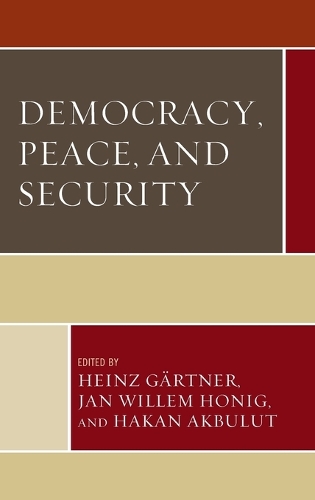
Democracy, Peace, and Security
(Hardback)
Publishing Details
Democracy, Peace, and Security
By (Author) Heinz Grtner
Edited by Jan Willem Honig
Edited by Hakan Akbulut
Bloomsbury Publishing PLC
Lexington Books
17th June 2015
United States
Classifications
Professional and Scholarly
Non Fiction
Political structures / systems: democracy
Political science and theory
Peace studies and conflict resolution
327
Physical Properties
Hardback
190
Width 162mm, Height 235mm, Spine 19mm
417g
Description
Democracies are extremely unlikely to wage war against other democracies this main proposition of the Democratic Peace theory constitutes the starting point for this volume. Chapters authored by experts from different parts of the world explore the concept of Democratic Peace in greater depth in relation to selected issue areas and in comparison to other concepts such as security communities or concerts of powers. The role and significance of international organizations and gender equality, for instance, are discussed and assessed in this context. The objective guiding this exercise is to give an answer to the question as to whether Democratic Peace and the other two concepts i.e. security communities and concerts of powers can provide a solution to todays security challenges and constitute a guide to peaceful co-existence and conflict settlement. So, the chapters discuss intellectual frameworks at some length, at the same time, reflecting on potential inferences for the outside world and highlighting associated challenges, limits, or even possible adverse implications.
Reviews
Prompted by the commemorations of the onset of the First World War a century ago, this book asks what amounts to the key question for anyone interested in world politics: What makes for a peaceful order Focusing on the nexus of democracy, order and peace, the volume provides extraordinarily nuanced and very timely answers to this question. -- Markus Kornprobst
Democracy, Peace, and Security is an important contribution to the ongoing debate about the impact democracy has on peace and security. This book is an important intellectual tool for academics, graduate students, and faculty who are following this debate; but also for persons active in politics who are interested in a perspective which goes beyond the daily routine. The book establishes a link between academia, politics, and policies an eye opener for all studying and doing research in International Relations. -- Anton Pelinka
Author Bio
Heinz Grtner is academic director of the Austrian Institute for International Affairs and senior scientist at the Department of Political Sciences at the University of Vienna. Jan Willem Honig is senior lecturer in the Department of War Studies, Kings College London. Hakan Akbulut is researcher with the Austrian Institute for International Affairs and a lecturer in political science at the University of Vienna.
